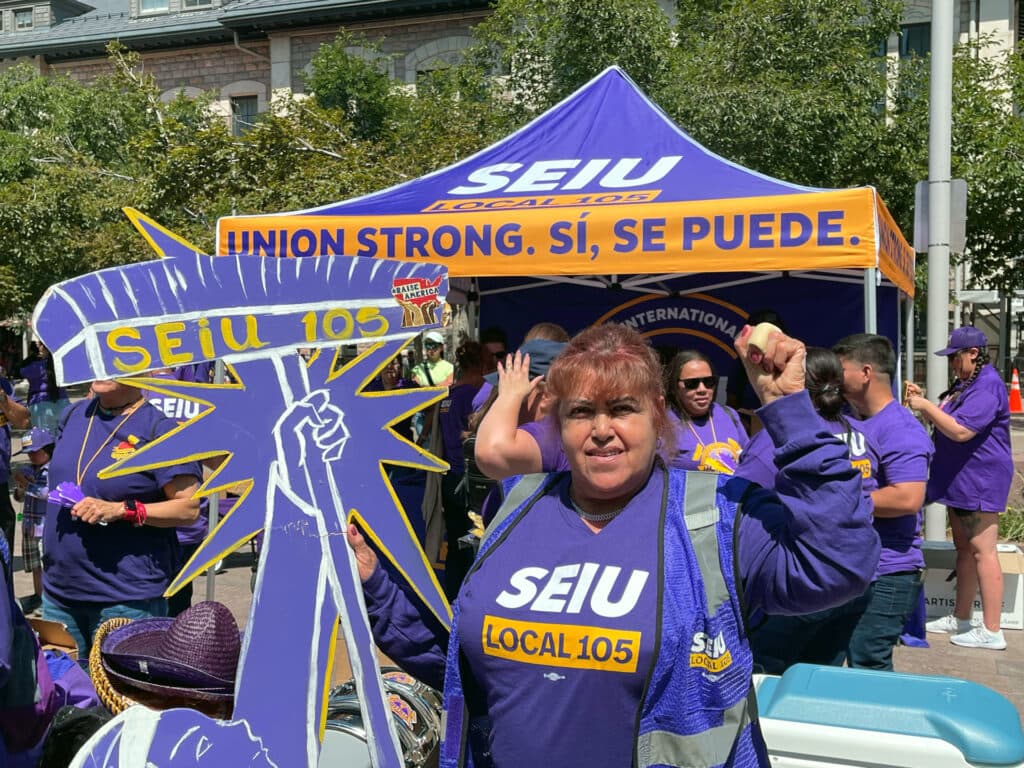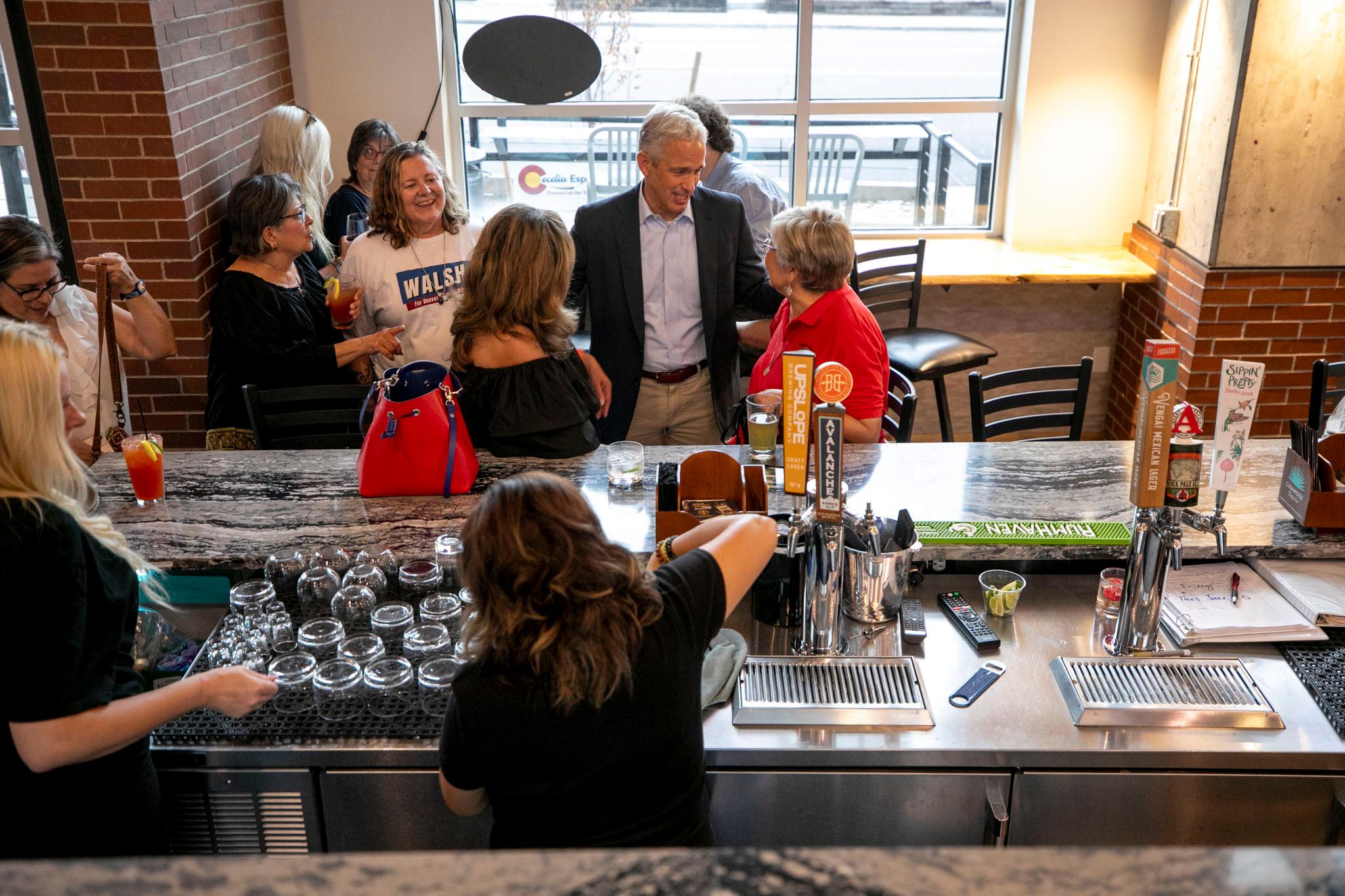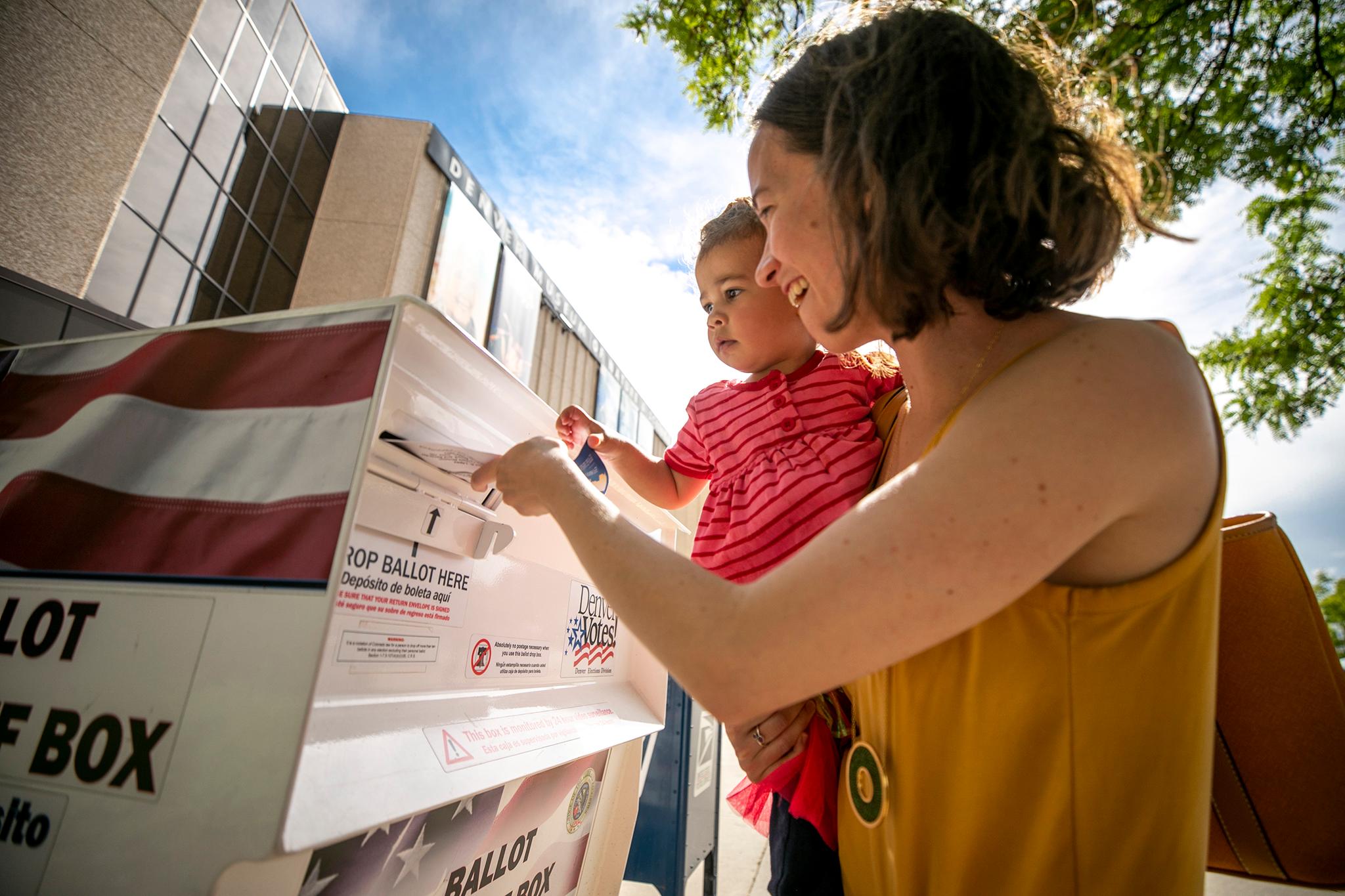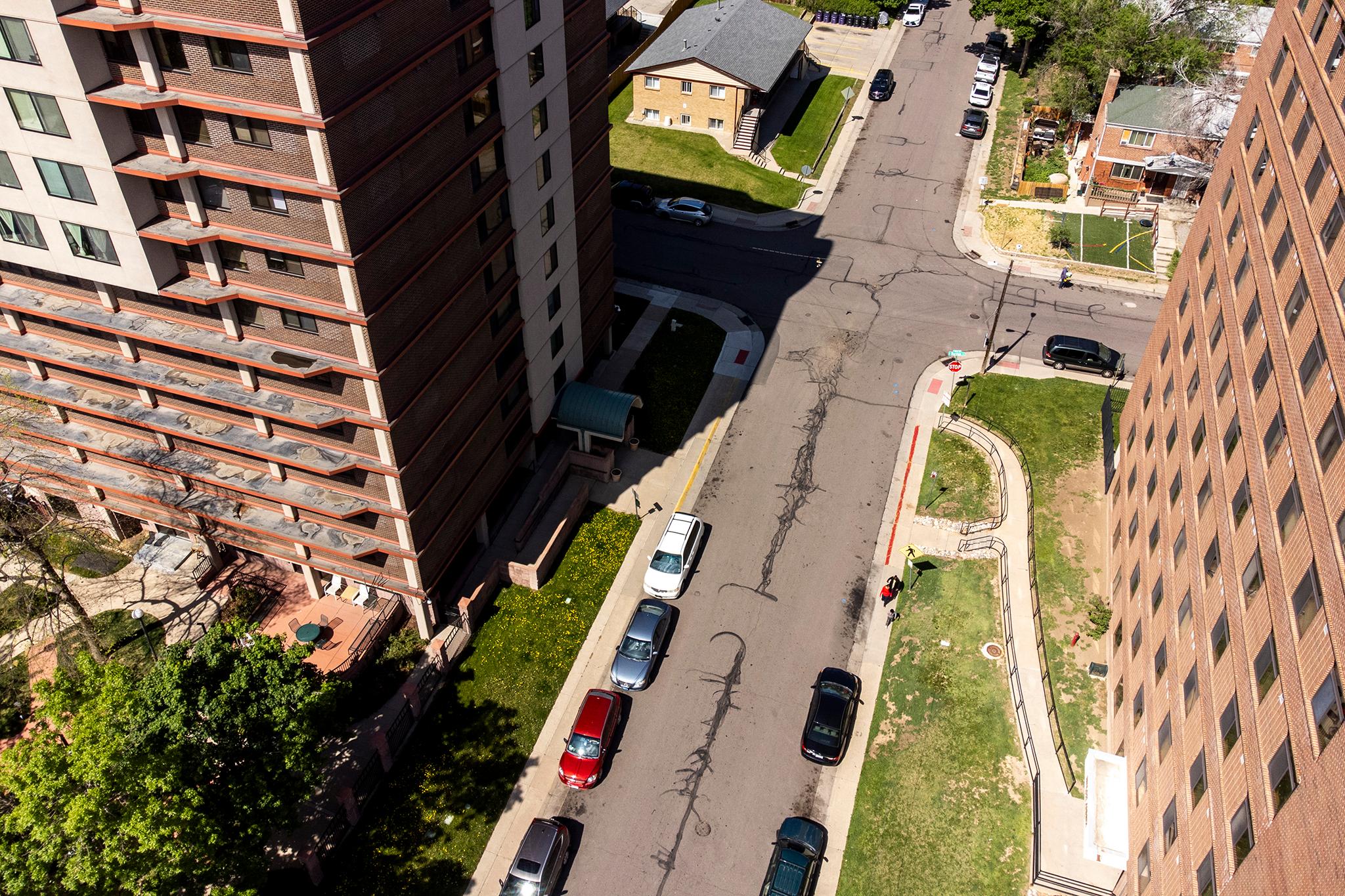Shortly after Maria Hernandez came from Mexico to the United States in 1985, she got her first and only job in this country: working the night shift as a janitor.
For nearly four decades, she cleaned 12 floors of a downtown Denver office building where the Colorado Department of Labor and Employment does business.
Now she plans to retire in a few months.
But first, she’s helping negotiate a contract for better wages, health care and retirement benefits for the more than 2,300 unionized janitors who work downtown. More than 90 percent of them are also Latina immigrants.
Janitors need more money and benefits to live in Denver, the union argues. But the city’s downtown office economy has taken a beating, and raising pay and benefits could be challenging in this market, their employers argue.
For Hernandez, these fights are nothing new.
An early member of the Denver Justice for Janitors campaign, she has spent decades fighting for better working conditions and struggled for a higher minimum wage citywide.
She’s marched in the streets, picketed and gone on strike. She was even arrested during a protest for “making too much noise,” she said in Spanish, and she’s proud of it.
Now, as her career comes to an end, Hernandez is willing to fight again if it means better working conditions for women like her, struggling to make enough money to raise families in this city, to pay rent and maybe even retire.
Working away from family, for unknown bosses
Hernandez worked hard for her family, getting by on near-minimum wage earnings.
She scrubbed toilets in dozens of bathrooms a day, threw out the trash, vacuumed the floors. She’s one of the longest-employed people in the building where she works, yet among those who get the least recognition and compensation.
She doesn’t know the people she works for. Not the bosses, not even most of the employees of the Colorado Department of Labor and Employment whose messes she tidies.

Her schedule makes her an invisible part of their lives. After all, the workers in the building are long gone, back home with their friends and families, when she’s getting started, making sure they have a nice place to conduct business.
Over her 38-year career, she raised three children who all still live in Denver: one daughter who now works with people with disabilities, another who remodels pools and a son who works in a law firm.
While they were growing up, she’d leave her home in the Lincoln Park neighborhood for work before they’d get back from school. She would return from work while they were still asleep.
She lost precious time with her kids.
“It is difficult, but one needs to work to survive,” she told Denverite, standing outside the highrise she cleans before a Friday night shift in June.
These days, her kids tell her they’re grateful for the life she provided, even if it was hard for them to be apart from their mother so often.
Now that retirement is approaching, can she afford it?
Her family has lived in the same house for decades, though her kids have moved on. Her husband passed away recently, and she’s shouldering the bills on a paycheck that doesn’t match Denver’s cost of living.
And rent has gone up mightily. Her family paid roughly $500 in rent decades ago. Now, without her husband, she pays more than $2,000 a month.
After 35 years, Hernandez’s pay is just a little over a dollar higher than Denver’s minimum wage of $18.29.

On the eve of retirement, Hernandez is not certain she can afford to stay here. Denver’s too expensive, and she hasn’t been able to save enough to make it without working.
“It’s sad,” she said.
She’s considering moving to another state or even back to Mexico, where the cost of living is lower. But she’d hate to leave her kids.
“There you can own your own house,” she said. “Here you have to rent.”
Her hours haven’t changed after all these years, but the workload has.
Since the pandemic, the downtown offices have emptied out. Many janitors lost their jobs. Hernandez was among those who stayed, shouldering extra work.
Even with lots of chatter about downtown coming back to life, the office buildings have not been restaffed to pre-pandemic levels. The janitors still employed have been doing extra labor without significant raises.
The work itself is tiring and, for some, dangerous.
“Many times the chemicals are very strong,” she said. “They give people allergic reactions. There are people who have been unable to work because of what the chemicals do.”
What do the bosses do to help?
“It’s not important to the owners that the chemicals they give you make you sick or hurt you,” she said.
Marching for better pay and benefits
Hernandez was voted by more than 2,400 janitors in Service Employees International Union Local 105 to represent them in contract negotiations with multiple companies charged with keeping downtown offices clean, including CCS Facility Services, ABM and Master Klean.
The workers are demanding better pay, health insurance and retirement benefits.
The negotiations launched on June 17. Janitors marched alongside other SEIU members, labor activists and State Rep. Tim Hernandez.
“We know that when workers who are directly impacted have improved conditions that everything around them becomes improved,” Rep. Hernandez said to a cheering crowd.
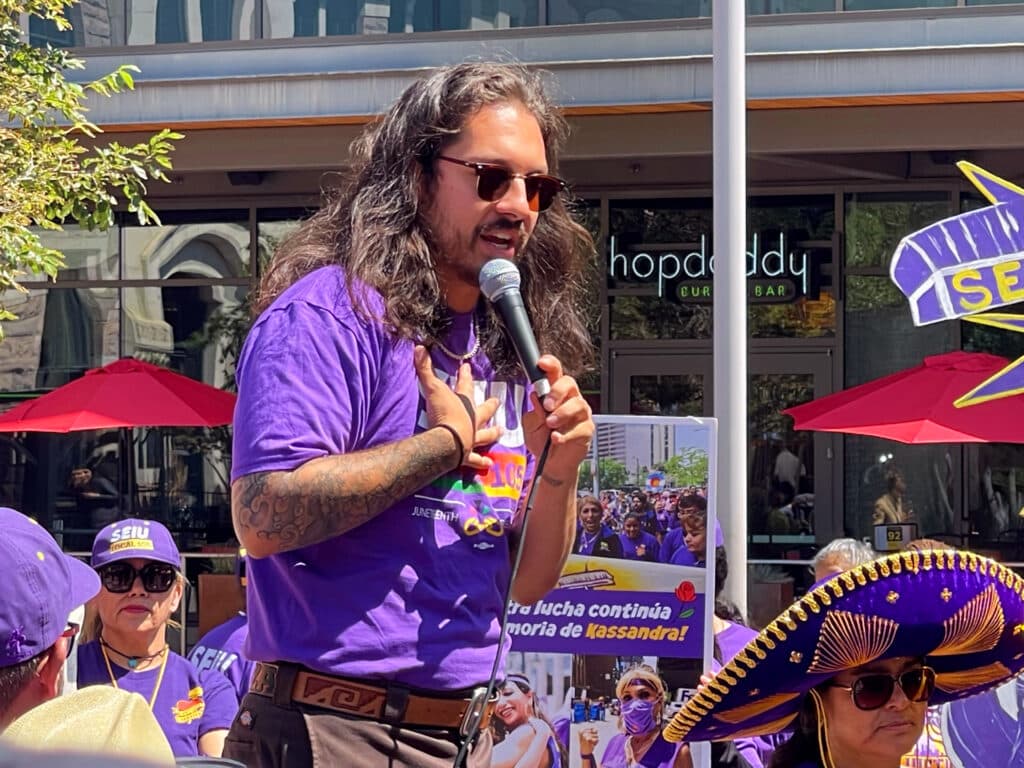
Stephanie Felix-Sowy, President of SEIU Local 105, said the group was fighting for higher wages, better health care benefits, and retirement packages.
Discussions began Monday morning and were slated to continue until later in the day.
“With the growth in Denver, and with the kind of revitalization efforts in the downtown, our members feel like they've been left behind at this point,” Felix-Sowy said. “And so this is our opportunity to really concentrate on what are fair wages, competitive wages, where we can attract and retain folks in this industry.”
Downtown office building owners have been struggling after the pandemic.
John Nesse, the attorney who represents the six companies united in negotiations under the name Denver Janitorial Contractors, says the city center’s commercial real estate market is hurting.
While he declined to comment on specific points in the negotiation, he suggested that the market isn’t favorable to expensive changes in the contracts.
“The Denver office market has a record high vacancy rate right now, and like a lot of office markets, it's struggling,” Nesse said. “So we expect that that will have an impact on these negotiations.”

There are already eight meetings on the calendar between the union and Nesse.
“We're very early in the process, and you know, our goal is to negotiate a contract that reflects the realities of the Denver market, and to do that in a way that ends with a handshake with the union and an agreement before the expiration of the contract,” he said.
What's next for contract negotiations
While both parties hope to reach an amenable agreement by the contract's expiration on July 28, that isn’t guaranteed.
Is Hernandez optimistic the contract will favor the janitors?
“Hopefully,” she said.
If the contract expires and a deal hasn’t been struck, workers could walk off the job in protest — an outcome neither party wants.
But the union is ready to fight for the long haul for better wages and benefits.
“If the owners of the companies do not want to accept what the people are asking of them,” she said, “we are ready to go on strike.”
